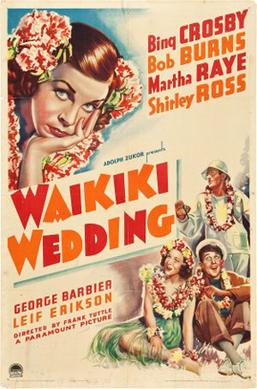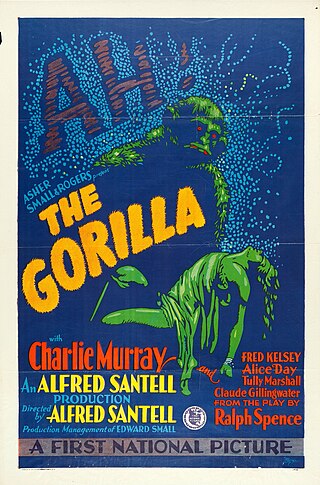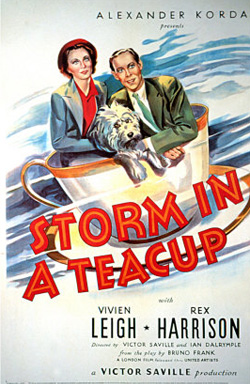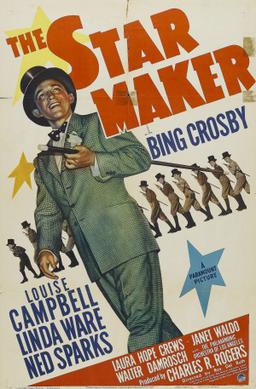
Another Thin Man is a 1939 American detective film directed by W. S. Van Dyke, the third of six in the Thin Man series. It again stars William Powell and Myrna Loy as Nick and Nora Charles and is based on Dashiell Hammett's Continental Op story "The Farewell Murder". The Charles' son Nicky Jr. is introduced for the first time. The cast includes their terrier Asta, Virginia Grey, Otto Kruger, C. Aubrey Smith, Ruth Hussey, Nat Pendleton, Patric Knowles, Sheldon Leonard, Tom Neal, Phyllis Gordon and Marjorie Main. Shemp Howard, later of The Three Stooges, appears in an uncredited role as Wacky.

The Hurricane is a 1937 film set in the South Seas, directed by John Ford and produced by Samuel Goldwyn Productions, about a Polynesian who is unjustly imprisoned. The climax features a "hurricane" generated through special effects. It stars Dorothy Lamour and Jon Hall, with Mary Astor, C. Aubrey Smith, Thomas Mitchell, Raymond Massey, John Carradine, and Jerome Cowan. James Norman Hall, Jon Hall's uncle, co-wrote the novel of the same name on which The Hurricane is based.

Waikiki Wedding is a 1937 American musical film directed by Frank Tuttle and starring Bing Crosby, Bob Burns, Martha Raye, and Shirley Ross. Crosby plays the part of Tony Marvin, a PR man charged with extolling the virtues of the Territory of Hawaii. The female lead, played by Shirley Ross is a local beauty queen who makes unhelpful comments about the islands. Bob Burns, along with Martha Raye, are the "comic relief". Amongst the supporting cast was a young Anthony Quinn. It was made by Paramount Pictures as a rival to the Fred Astaire and Ginger Rogers films then being made by RKO Pictures.

Mary Elizabeth Patterson was an American theatre, film, and television character actress who gained popular recognition late in her career playing the elderly neighbor Matilda Trumbull on the television comedy series I Love Lucy.

The Cat and the Canary is a 1922 stage play by John Willard, adapted at least four times into feature films, in 1927, 1930, 1939, and again in 1979. The original stage play opened on Broadway February 7, 1922.

The Cat and the Canary is a 1927 American silent comedy horror film directed by Paul Leni. An adaptation of John Willard's 1922 black-comedy play of the same name, the film stars Laura La Plante as Annabelle West, Forrest Stanley as Charlie Wilder, and Creighton Hale as Paul Jones. The plot revolves around the death of Cyrus West, who is Annabelle, Charlie, and Paul's uncle, and the reading of his will twenty years later. Annabelle is revealed as the heir, but she and the other guests must still face a night in his haunted mansion. The plot thickens when they are informed that a lunatic known as the Cat has escaped from an asylum and is hiding in the house.

The Cat Creeps is a 1930 American pre-Code mystery film directed by Rupert Julian based on the 1922 play The Cat and the Canary by John Willard. The film is a sound remake of The Cat and the Canary (1927). Starring Helen Twelvetrees, Raymond Hackett, Neil Hamilton, Lilyan Tashman, Jean Hersholt, Elizabeth Patterson, and Montagu Love.

The Cat and the Canary is a 1978 horror film directed by Radley Metzger and starring Honor Blackman, Michael Callan, Edward Fox, Wendy Hiller, Olivia Hussey, Wilfred Hyde-White, Beatrix Lehmann, Carol Lynley, Daniel Massey, and Peter McEnery. It follows a group of potential heirs who are summoned to the mansion of a deceased beneficiary to view the filmed reading of his will, only to discover upon arrival that a deranged killer may have infiltrated the event.

The Gorilla is an American 1927 silent mystery film directed by Alfred Santell based on the play The Gorilla by Ralph Spence. It stars Charles Murray, Fred Kelsey, and Walter Pidgeon.

Elliott Nugent was an American actor, playwright, writer, and film director.

The Promise is a 1979 American romantic drama film released by Universal Pictures which starred Kathleen Quinlan, Stephen Collins, and Beatrice Straight. It was directed by Gilbert Cates and produced by Fred Weintraub and Paul Heller. Weintraub and Heller also wrote the source story, which Garry Michael White dramatized; the resultant film was novelized by Danielle Steel. It was remade in India as the Hindi film Yeh Vaada Raha (1982).

Bright Lights, later retitled Adventures in Africa, is a 1930 American pre-Code musical comedy film produced and released by First National Pictures, a subsidiary of Warner Bros. It premiered in Los Angeles in July 1930 but was edited and rereleased in early 1931. Although it was photographed entirely in Technicolor, the only surviving print is in black and white. The film stars Dorothy Mackaill, Frank Fay, Noah Beery and Frank McHugh. It also features the screen debut of John Carradine, who appears in a small, uncredited role.

Games is a 1967 American psychological horror film directed by Curtis Harrington and starring Simone Signoret, James Caan, and Katharine Ross. Its plot follows two jaded Manhattan socialites who engage in a series of mind games with a German cosmetics agent whom they invite into their home.

Little Lord Fauntleroy is a 1936 American drama film based on the 1886 novel of the same name by Frances Hodgson Burnett. The film stars Freddie Bartholomew, Dolores Costello, and C. Aubrey Smith. The first film produced by David O. Selznick's Selznick International Pictures, it was the studio's most profitable film until Gone with the Wind. The film is directed by John Cromwell.

Storm in a Teacup is a 1937 British romantic comedy film directed by Ian Dalrymple and Victor Saville and starring Vivien Leigh, Rex Harrison, Cecil Parker, and Sara Allgood. It is based on the German play Sturm im Wasserglas by Bruno Frank, as well as the English-language adaptations: London's Storm in a Teacup and Broadway's Storm Over Patsy, both written by James Bridie. A reporter writes an article that embarrasses a politician. Meanwhile, the newspaperman is also attracted to his target's daughter.

Pennies From Heaven is a 1936 American musical comedy film directed by Norman Z. McLeod and starring Bing Crosby, Madge Evans, and Edith Fellows.

The Three Musketeers is a 1939 musical comedy film adaptation of Alexandre Dumas's 1844 novel The Three Musketeers directed by Alan Dwan and starring Don Ameche as d'Artagnan, with the Ritz Brothers as his cowardly helpers. While the film can be found online, it did have an original copyright notice and renewal.

Loose Ankles is a 1930 pre-Code romantic comedy with songs, produced and released by First National Pictures, which had become a subsidiary of Warner Bros. The film was directed by Ted Wilde and stars Loretta Young, Douglas Fairbanks, Jr., Louise Fazenda and Edward Nugent. It was a remake of the 1926 silent film titled Ladies at Play, which had been produced by First National Pictures. Both versions were adapted by Gene Towne from the 1926 play Loose Ankles by Sam Janney. Sam Janney was to direct the film but died in a car crash during production.

The Star Maker is a 1939 American musical film directed by Roy Del Ruth, written by Frank Butler, Don Hartman and Arthur Caesar, and starring Bing Crosby, Louise Campbell, Linda Ware, Ned Sparks, Laura Hope Crews, Janet Waldo and Walter Damrosch. Filming started in Hollywood on April 17, 1939 and was finished in June. The film was released on August 25, 1939, by Paramount Pictures, and had its New York premiere on August 30, 1939. It was the only film in which Crosby played a happily married man.

Let 'er Buck is a 1925 American silent Western film directed by Edward Sedgwick and starring Hoot Gibson.





















